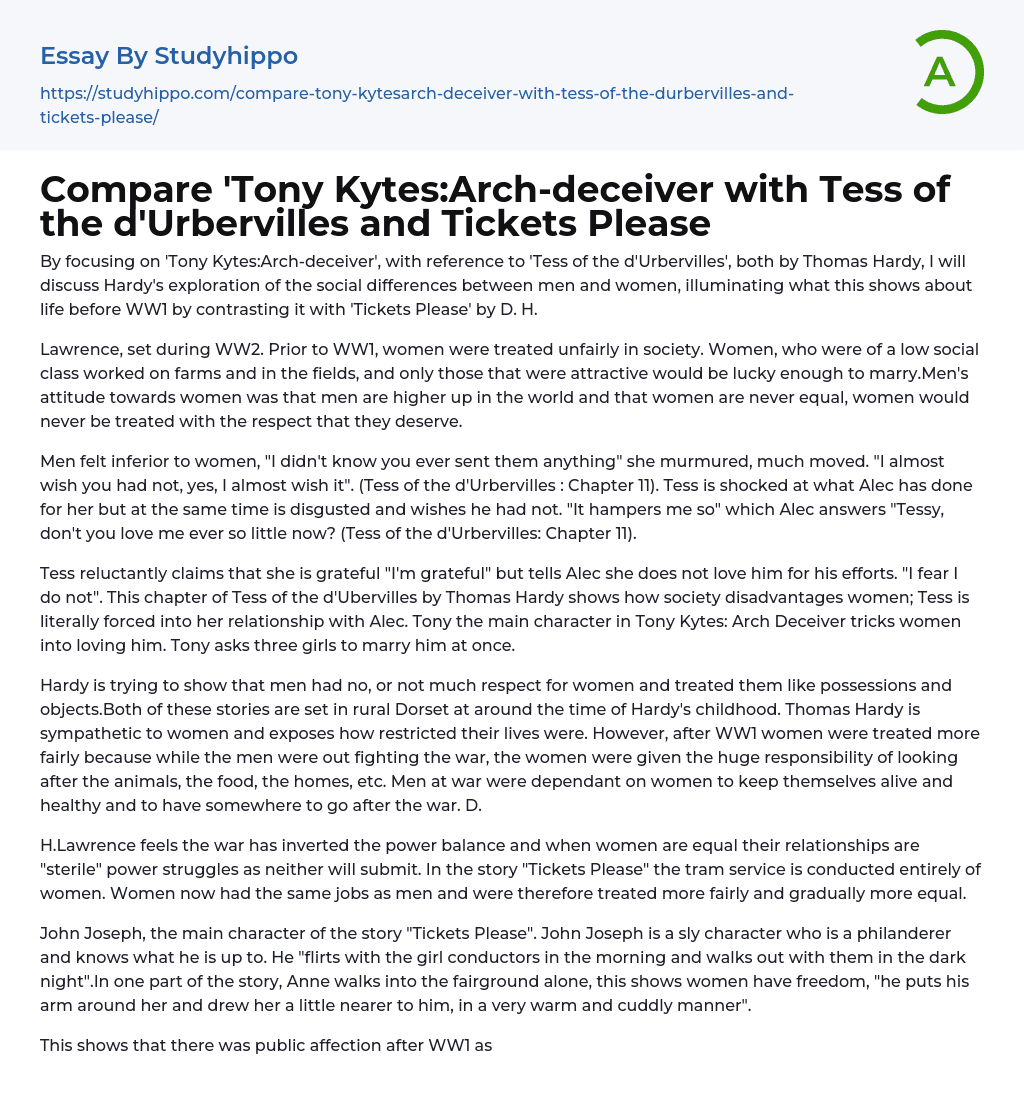

Compare ‘Tony Kytes:Arch-deceiver with Tess of the d’Urbervilles and Tickets Please Essay Example
This essay will examine Hardy's investigation of the gender gap in society during the pre-World War I era by analyzing 'Tony Kytes: Arch-deceiver' and 'Tess of the d'Urbervilles', in comparison to D.H. Lawrence's 'Tickets Please'.
The text discusses society's treatment of women before and during WW1. Before the war, women of low social class worked in agricultural industries, with their marital prospects determined by their physical appearance. Men believed themselves superior to women and refused to treat them with the respect they deserved.
In chapter 11 of Tess of the d'Urbervilles, we see that men felt inferior to women. Tess is greatly moved by what Alec has done for her, but also feels disgusted and wishes he had not done it. Alec asks if Tess loves him even a little. "I didn't know you ever sent them anything,"
...she murmured. "I almost wish you had not, yes, I almost wish it." Tess feels that what Alec has done for her "hampers" her.
In this chapter of Thomas Hardy's Tess of the d'Ubervilles, Tess expresses her gratitude to Alec but admits that she does not love him despite his efforts. She feels that her situation is a prime example of how society places women at a disadvantage by compelling them into unwanted relationships. Similarly, Tony, the protagonist in Tony Kytes: Arch Deceiver, manipulates women into falling in love with him by proposing to three different girls at the same time.
Hardy's works depict the disregard men had for women in rural Dorset during his childhood, viewing them as mere possessions or objects. Although women faced limitations in their lives, Hardy portrays empathy towards their circumstances. He als
recognizes that post-WW1, men's departure to war left women with the responsibility of maintaining their homes and animals, resulting in an improvement of women's treatment. Consequently, men became increasingly dependent on women for survival and a place to return to after the war. D.
In his view, H.Lawrence believes that the war has led to a reversal of power dynamics, resulting in relationships between men and women becoming "sterile" contests of power as neither side will yield. This perspective is reflected in the story "Tickets Please", where the tram service is staffed entirely by women who hold the same jobs as men, resulting in a more equitable and increasingly equal treatment of women.
John Joseph is the cunning protagonist in "Tickets Please". He is a womanizer and well aware of his behavior, frequently "engaging in friendly banter with female conductors during the day and accompanying them home at night". Meanwhile, the fact that Anne visits the fairgrounds alone demonstrates women's newfound independence. When John Joseph embraces her, he does so affectionately and intimately.
The passage from Tess of the d'Urbervilles, Chapter 36, highlights a newfound public affection after WW1 and the shift in societal norms. The quote states that having a third person in the house was deemed awkward, showing a change in attitudes towards romantic relationships. Additionally, D.H. Lawrence's story also touches on the topic of choosing a partner, as John Joseph and Tony had to choose from a group of individuals they were interested in.
The portrayal of women in literature during World War One was one of strength and rebellion. In "Tickets Please" by D.H. Lawrence, the protagonist swings her belt with a buckle at
a man who crossed her, showing that women could stand up for themselves. Lawrence uses animalistic language to describe women such as "he was their sport now," and "blood was up now." The defeated male character in the story is described as lying still and at the mercy of his captor, illustrating the power shift between the sexes. This short story, along with "Ton Kytes: Arch Deceiver," highlights the lives of both men and women before and during WW1. Personally, "Tickets Please" is my preferred story because it shows women assertively defending themselves.
My writing style preference is for D. H. Lawrence's straightforward approach, which also generates a more immersive ambiance. Nevertheless, in terms of examining gender disparities in society, Thomas Hardy's Tess of the d'Urbervilles illustrates the inequitable circumstances women encountered, such as Tess being forced into a relationship with Alec and Angel rejecting her despite her distress. It is evident that men treated women unjustly before WW1; however, during the conflict, women gained additional responsibilities and gradually garnered men's admiration.
Women started receiving fair and equal treatment from men during this period.
- 1984 essays
- A Farewell to Arms essays
- A Good Man Is Hard to Find essays
- A Hanging essays
- A Lesson Before Dying essays
- A Long Way Gone essays
- A Rose For Emily essays
- A Separate Peace essays
- A Tale Of Two Cities essays
- A Very Old Man With Enormous Wings essays
- Adventures Of Huckleberry Finn essays
- Alice in Wonderland essays
- All Quiet on The Western Front essays
- Allegory of the Cave essays
- An occurrence at owl creek bridge essays
- Animal Farm essays
- Anthem essays
- Antigone essays
- Arthur Conan Doyle essays
- As I Lay Dying essays
- Atticus Finch essays
- Barn Burning essays
- Battle Royal essays
- Beauty and The Beast essays
- Beloved essays
- Boo Radley essays
- Brave New World essays
- Candide essays
- Castle essays
- Characters In Hamlet essays
- Characters In Romeo And Juliet essays
- Christmas carol essays
- Chronicle of a Death Foretold essays
- Cinderella essays
- Crime and Punishment essays
- Daisy Miller essays
- Death of a Salesman American Dream essays
- Desdemona essays
- Diary Of A Wimpy Kid essays
- Dracula essays
- Dubliners essays
- Emma essays
- Ender'S Game essays
- Ethan Frome essays
- Eveline essays
- Fahrenheit 451 essays
- First-Person Narrative essays
- Fish Cheeks essays
- Frankenstein essays
- Genesis essays



